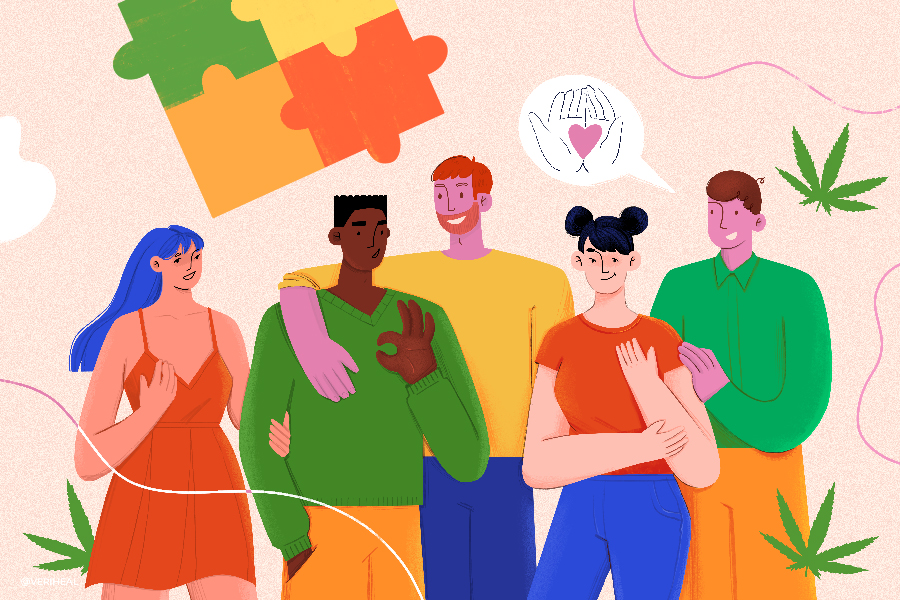Investigators from the University of New Mexico (UNM) have contributed yet another valuable piece of research to the field of cannabis medicine. This time, they’ve been delving deep into the influence that cannabis has on psychological functioning, only to discover that cannabis consumers tend to be nicer people!
Titled “Cannabis Consumption and Prosociality,” the new study was recently published in the journal Scientific Reports. As per the results, healthy college students with varying levels of tetrahydrocannabinol (THC) in their urine appeared to be overall nicer people.
In comparison with those who did not have THC in their system, the cannabis-exposed young adults returned much higher scores in the following areas of psychological assessment:
- Prosocial behaviors
- Empathy
- Fair and harmless decision-making
“I am honored to be part of this groundbreaking research showing that cannabis may have significant societal benefits,” said co-author of the study and psychology teacher at UNM, Tiphanie Chanel. “I hope that this work can help pave the road to more fully explore the effects of cannabis on human interactions and wellbeing.”
Cannabis May Serve as an Ego-Busting Tool
One of the most interesting takeaways from this study into the psychological impacts of cannabis use in young adults centered around the plant’s ability to dismantle ego-centric self-concepts. The ego is an element of the human personality that focuses on the “self” or “I” experience through perceived contact with the outside world. It is believed to form during the first three years of a child’s life.
According to the study results, participants showed an increased sense of selflessness and greater responsibility to protect other people from unjust harm after consuming cannabis. Plus, the male study subjects returned higher scores on the “agreeableness” aspect of personality after loading up on the cannabis plant’s active chemical compounds.
Effects of Cannabis Are Transient
Most of the disparities in prosociality measures among cannabis consumers and non-consumers corresponded with the length of time since study subjects last consumed cannabis. Ultimately, this tells us that the effects of cannabis are fleeting.
Why You Should Get Your Medical Marijuana Card
Veriheal has satisfied millions of patients nationwide by giving them access to these benefits
- Larger purchase limits
- Peace of mind
- Enhanced legal protection
- Access to higher potency strains
- Save up to 25% on cannabis purchases
- Skip the line at the dispensary
“The transience of the effects supports that cannabis is triggering behavioral and perceptual changes rather than that cannabis users and non-user differ fundamentally in their baseline approaches to social interactions,” said co-author and Associate Professor Sarah Stith, UNM Department of Economics.
Cannabis’ effects can be felt faster with certain methods of cannabis consumption, such as by smoking joints or using a vaporizer device (inhalation) and dropping oil tinctures beneath the tongue (sublingual administration). The effects may last longer if cannabis compounds are ingested, such as in the form of a cannabinoid-infused edible.
Anger Levels Weren’t Largely Impacted
The researchers did not observe any major changes in measurements of anger, trust, hostility, moral decision-making, facial threat interpretation, and four other elements of personality (conscientiousness, emotional stability, extraversion, and openness) among users and non-users of cannabis.
“I often refer to the Cannabis plant as a super medication, relative to most other conventional pharmaceutical products, because it is not only effective for treating the symptoms of a wide range of health conditions, quickly and relatively safely, but now we have concrete evidence that it may also help improve the average person’s psychosocial health,” said lead investigator and Assistant Professor Jacob Miguel Vigil, who works in the UNM Department of Psychology.
The findings were based on principles of preserving the concept of purity and respecting authority.
Cannabis’ Impact on Interpersonal Interactions
Since this is one of the first studies of its kind to demonstrate the psychosocial, non-clinical advantages of cannabis consumption among healthy young adults, it’s no wonder why the findings have garnered immense attention from the medical cannabis community.
“Most investigations on the effects of using cannabis have focused on either negative consequences of cannabis addiction or on the physical health effects of cannabis use,” said Vigil, adding that, “almost no formal scientific attention has been devoted to understanding other psychological and behavioral effects of consuming the plant, despite it being so widely used throughout human history.”
If the results are anything to go by, cannabis could improve prosocial behavior, which “benefit[s] other people or society as a whole, such as helping, sharing, donating, co-operating, and volunteering.” The study authors concluded that cannabis’ influence on “interpersonal interactions could be more valuable to societal wellbeing than its medicinal effects.”
Author, Share & Comments















